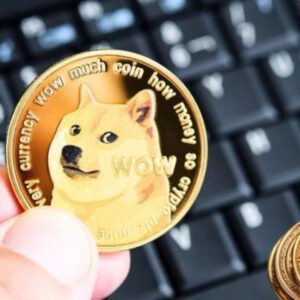Non-Fungible Tokens (NFTs) Revolution in Tokyo: Focusing on the New Era of Digital Ownership. 01

Non-Fungible Tokens (NFTs)
What if you had a digital painting, an exclusive sneaker, or even a meta-verse token for a portion of real estate? And what if this digital asset belonged to you and only you? Enter Non-Fungible Tokens (NFTs). For the residents of Tokyo, a metropolis that embraces all aspects of both technology and culture, NFTs are becoming much more than just a buzzword, rather, an evolution that is changing the very aspect of ownership, authorship, and value in the digital space.
What are NFTs, and why would Japan in general be interested in such a concept?
Non-Fungible Tokens (NFTs): Essentially, Non-Fungible Tokens (NFTs) is a digital asset that originates from the blockchain and confirms the possession of a given item or product that is one of a kind. While there are currencies that are interchangeable such as bitcoins or ethereums, NFTs are unique and cannot be exchanged for each other. In other words, it can be referred to as a tradeable commodity or a popular piece of art that is rather rare. Would you exchange an original Hokusai print for an unheard-of one? The same theory applies in these cases.
For people living in Tokyo, which is already a fusion of ancient culture and advanced technology, there’s always a chance to explore more with NFTs. People working in the local community — be it artists, musicians, or even designers, have started utilizing this technology to market their creations in unimaginable ways. The city’s youth, who have never been shy to follow trends, are already in the game with NFTs thus, creating a vibrant market for the intersection of digital art and the blockchain.
2. NFTs: A Transformation in Ownership and Aesthetic
Let’s take a pause here for a second. Just a couple of years back, if someone had been asked about the ownership of a digital asset, they would have frowned. It would have been a confusing situation considering that the two words “digital” and “own” were practically antonyms. But, look at the world today, Non-fungible tokens (NFTs) have completely changed that perspective.
In this day and age, it is just a mouse click away to own a precise second within history, a specific picture, or even some unique digital item. No more asking if that artwork that I have downloaded from the internet is “genuinely” mine. Blockchain has made it such that ownership is currently unquestionable, clean, and well-protected against manipulation.
I would like to narrate a story that will resonate well with the residents of Tokyo’s art ecosystem. One of my friends, an artist with several exhibitions in one of Shibuya’s fashionable galleries, was against NFTs in the first place. Why would someone even consider purchasing my art virtually? he wondered.
But after a couple of hours spent doing research during the night, he was convinced to go for it. Thank you fast forward a few months – his digital work is now an NFT, and it is being sold for thousands of dollars. The best part? He has retained ownership of the work as well, and each transaction enhances the legacy he has built.
As he puts it, it was even his quote, Non-Fungible Tokens (NFTs) allow me to have eight of my works into something that appreciates with time. Even more, digital art has finally found its true home: The internet.
3. Why Tokyo is Leading the Evolution of NFTs?
Notably, Tokyo is a melting pot of technology, gaming, and pop culture and it is best suited to lead the NFT charge. The city has been exposed to digital culture as they know it – the anime boom and manga for instance have opened doors for fans around the world, further elevating the virtual fandom. Yet, most of the successful NFT projects draw their basis from some popular phenomenon as well. Now anime characters, game avatars, and other flashy digital objects are being turned into assets and making a lot of rounds in the market.
Further, also Tokyo’s economy has a strong emphasis on technology. A lot of big businesses are asking how NFTs can transform the fashion, entertainment, and even the real estate markets. For instance, such developments are visible in Tokyo’s Akihabara district, where the use of Non-Fungible Tokens (NFTs) is growing thanks to the popularity of VR and AR elements. Imagine this: in the not-so-distant future, if Tokyo’s imaginary meta-verse turns real, you will be able to buy virtual real estate with Non-Fungible Tokens (NFTs) art and decorative items that are all recorded on the blockchain.
5. How do NFTs Even Work in the Living Space: What Comes Next in Tok yo?
There’s no shortage of advancements to come for the NFTs in Tokyo. We have witnessed the emergence and growth of the digital market, and we can only be optimistic about its future. Will we see the end to ever-present ownership in favor of NFTs? Visualize a lot of your assets being based on NFTs, from your auto to your home and even your event tickets. Or maybe NFTs will turn into social prestige and the more NFTs you’ve got the more social stature you have, just the way it is with luxury items today.
NFTs now seem to have their relevance in virtual worlds and gaming as well. In a gaming metropolis such as Tokyo, it is only logical that NFTs are already used in virtual games. What about bringing Final Fantasy or Persona—two games that are really popular? What if your in-game accomplishments, attire, or even exclusive in-game objects are held in the form of NFTs? Gamers would never be restricted to the interiors of a video game. Rather, they would have an actual economy for their virtual assets.
Conclusion: All That You Need To Know About NFTs Is That They Are Not Going Anywhere.
NFTs are not a fad or something seasonal. They are a solution to the way we appreciate worth and possession in the current world. And in Tokyo, that is already happening with artists and other creators pushing boundaries. If you’re a self-described art aficionado, an illustrator, or a preoccupied bystander with NFTs, you’re in for a treat as there’s a lot in store.
Let me pose the final remark: we used to get used to physical possessions, but the time is near when it will be about what we cannot see – assets that come in a digital format. The issue is not about the sustainability of Non-Fungible Tokens (NFTs). It is one of whether you want to be an integral part of this digital era.
Frequently Asked Questions
Why should Tokyo care about NFTs? Is this a trend, or is it here to stay?
Tokyo, with its cutting-edge blend of technology, gaming, and pop culture, is the perfect place to champion the NFT revolution. The city’s embrace of everything digital—from anime to VR—makes it a natural fit for NFTs. In fact, it's not just about buying digital art; NFTs are reshaping how Tokyoites view ownership, from virtual real estate to fashion and even gaming assets. So no, it’s not just a passing trend—Tokyo is positioning itself as a leader in this digital frontier.
How do NFTs work in practice, especially in a place like Tokyo?
Great question! Imagine walking through the streets of Akihabara, where VR and AR elements already blur the lines between the physical and digital worlds. NFTs here are taking that to a new level. Soon, you could buy a digital piece of art or a virtual apartment, and every transaction would be securely tracked on the blockchain. It's like having a receipt, but one that can’t be altered or lost. NFTs are set to revolutionize not only art but also how we interact with everything from entertainment to real estate.
1.Can NFTs really make an impact in everyday life, like in my own home or car?
Absolutely! Picture a world where your car, your home, even concert tickets, and event passes are all tied to NFTs. Not just as collectibles, but as proof of ownership. If your house was an NFT, you wouldn't need a stack of paperwork to prove it's yours. The future might even see NFTs becoming status symbols—just like owning a luxury item today. The more exclusive your NFTs, the higher your social prestige. It’s like collecting rare designer bags, but in a completely virtual way.
Are NFTs just for artists and collectors, or is there a broader appeal?
Sure, NFTs began in the art world, but their appeal stretches far beyond that. Tokyo’s gaming scene, for example, is already experimenting with NFTs, allowing gamers to truly own their in-game items. Imagine completing a quest in Final Fantasy and being able to trade or sell the sword you earned, as if it were an asset in the real world. NFTs have the potential to change how we view digital achievements, from gaming to entertainment, and even beyond.
1.Will NFTs continue to evolve, or have we reached the peak of their potential?
We’re only scratching the surface. While NFTs already influence art, music, and games, their potential is vast. In Tokyo, the possibilities seem endless. As technology advances, expect NFTs to permeate even more industries—maybe even the virtual economies of metaverses. If you're just dipping your toes into NFTs now, buckle up; the next few years are going to bring radical shifts in how we think about ownership and value in the digital age.
What’s the best way for someone in Tokyo to get started with NFTs?
Start small. Explore Tokyo's local NFT galleries or virtual marketplaces to get a feel for how NFTs are being used in art, fashion, and entertainment. You don't need to be an expert; just take the plunge into this vibrant community, as Tokyo’s creative minds are leading the way. One of my friends, an artist in Shibuya, was skeptical about NFTs at first—now, he's selling digital art for thousands! Your journey might begin with curiosity, but it could quickly evolve into a significant part of your digital life.
Are NFTs sustainable? Will they stick around or fade into obscurity?
In the world of NFTs, it’s not about whether they will stick around—it’s about how they’ll evolve. Think of it like the internet in the early 90s. Many questioned whether it was just a passing trend, but look at us now. NFTs are redefining ownership, and even though the space is still new, it's clear that they're not going anywhere. Whether you’re a gamer, an artist, or simply someone who loves new tech, NFTs are laying the foundation for the digital world of tomorrow.
What do NFTs mean for the future of art in Tokyo?
Imagine a world where Tokyo’s art scene is no longer confined to physical galleries but spills into virtual realms. NFTs have given artists a platform to monetize digital creations in ways never before possible. From digital painting to interactive VR art, the possibilities are endless. For artists, NFTs represent a new form of ownership, one that not only allows for creative freedom but also ensures their work retains value in a digital economy. It’s not just art; it’s a cultural evolution unfolding right in front of us.
1.What are some potential risks or concerns with NFTs in Tokyo?
Like any emerging technology, NFTs have their risks. The environmental impact of blockchain technology is one concern, as mining and transactions can be energy-intensive. Also, because NFTs are new, there's a steep learning curve and potential for scams. However, as Tokyo continues to lead the charge, it’s likely that regulations and more sustainable practices will emerge to safeguard the space. If you’re stepping into the world of NFTs, make sure to research, stay cautious, and understand the platform you're using. It’s the digital gold rush but with a little more caution required.
Also, Read-Travel and Work Jobs: How to Make Money While You Travel.01







